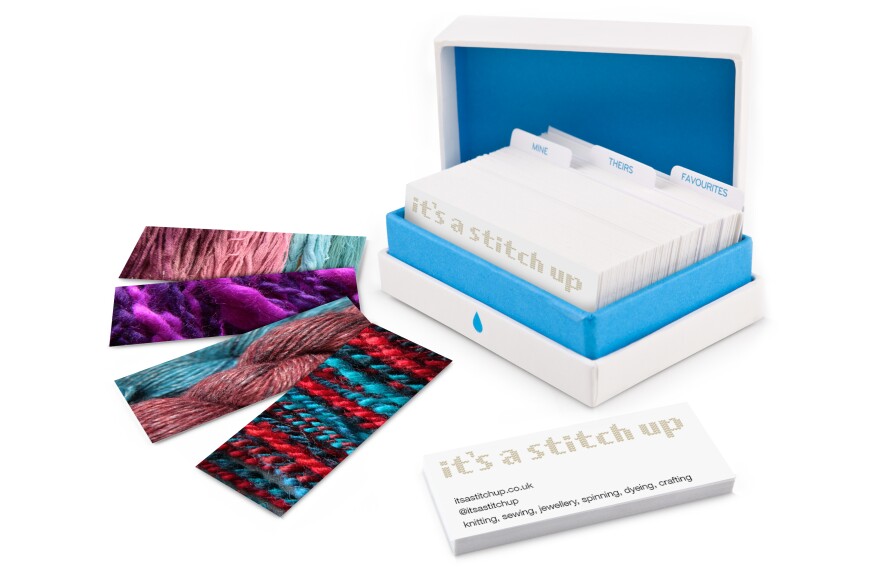If there is one rule at the Miami Shakers and Stirrers Business Networking Mixer it is this: DO NOT forget your business cards.
On a recent Tuesday evening, organizer Janette Tarafa stood at a corner table of Brickell’sFadò Irish Pub, cross-checking a list of guests. “Okay, let me get your name tag,” Tarafa said as a young woman walked up. “Do you have a business card?”
“I don’t,” said the young woman, “sorry.”
“You don’t?” Tarafa asked, incredulous. “Oh my gosh. Well, people are going to have a hard time getting in touch with you later.”

There’s a good chance Tarafa is more interested in business cards than the general public. While it’s tough to track overall business card production, Google searches for the words “business cards” have dropped off by about 50% over the last decade. A result, perhaps, of the fact that exchanging information digitally is easier than ever.
And yet there still appears to be a place for the paper business card.
Because imagine, says Tarafa, that two people meet at the mixer. They’re clicking, bouncing ideas back and forth and one of the people stops to pull out an iPhone.
“It’s just,” said Tarafa, “it’s like, for example, a dog running into the middle of the street while you’re driving.”
A bit severe, perhaps, but on target according to Nova Southeastern University’s Director of Career and Professional Development, Cynthia Henry Duval. “Because if they have a business card and they give it to you,” said Duval, “and you’re pulling out your phone, you’ve broken the flow of the contact.”
Duval oversees business etiquette training for Nova’s law students, which includes learning how to use “contact cards” -- business cards for students without an official business.
It’s easier than ever to throw someone’s contact information into a smartphone, something Duval has noticed her students do without thinking twice. The problem is a personal mobile device is still personal for a lot of people. “There have been people who have said that after they’ve given the student their phone number,” said Duval. “They’re thinking to themselves: Well, I hope they don’t text me.”
A business card is the handshake of exchanging contact information. It’s much safer than assuming everyone is comfortable with, say, hugging and kissing on the cheek.

This isn’t to say business cards can’t be intimate in their own way. The company Moo, which helped popularize those fancy little business cards with stylish designs on the back, printed 108-million cards in 2013 -- up by more than 400% from 2008.
Stephanie Shore, Moo’s vice president of marketing, thinks the digital world has left people more desperate than ever for tangible, personal interactions.
“When you’re looking at someone’s business card,” said Shore, “it’s like you’re looking someone in the eye. You want to understand what someone’s doing, you want to have a real connection.”
A real connection that Nelson Arencibia can demonstrate first-hand.
Arencibia did not set out to become a business card expert. But there he stood, his hands overflowing with them.
“Look,” he said, sifting through a pile of cards, “Four Seasons Hotel, Jerry Weed, director of engineering... You have SMB Architects... The Spiced Nut Factory. ‘Spiced nuts perfect for -- dot, dot, dot.’”
As general manager of Flanigan’s Seafood Bar and Grill in Coconut Grove, Arencibia is responsible for the monthly business card drawing for a free lunch (i.e. a $10 gift certificate). Over his 14 years at the restaurant Arencibia has seen thousands upon thousands of business cards.

“As a matter of fact,” he said, “I have [a particularly interesting card] in my car that I saved from this guy that’s an artist.”
That’s all Arencibia could remember. Had he simply input the artist’s name and number into a cellphone, that would be the end -- a contact lost in the digital abyss.
Instead, Arencibia grabs his keys, walks into the parking lot, ducks into his car and pulls out a colorful business card.
“So his name is Ralph Cabrera. He’s a professional illustrator,” said Arencibia. “But I thought it was cool. Little Superman here, things like that. All the artwork he does.”
A personalized design worth keeping, a tangible item that didn’t fall into the electronic void -- arguably Ralph Cabrera’s business card worked perfectly.
“Well, I’m here,” said artist Ralph Cabrera, “because a card that somebody showed you. So it does work.”
Ralph Cabrera worked for Marvel and DC Comics for about 15 years. Now he primarily does storyboards and mock-ups for advertising firms.
The flip-side to this successful business card story is a cautionary business card tale from his past.
That card he handed to Nelson Arencibia, it was actually a replacement card for a far less successful design. Cabrera pulled one of those old cards out of his bag.

“It’s got a black background, it’s a bold statement,” he said. “I thought it worked well at the time.”
“At the time” was anytime before November 2009. Because the centerpiece of that older card was a beautiful drawing, done by Cabrera, of golf legend Tiger Woods. And in November of 2009, a parade of alleged Tiger Woods mistresses started showing up.
“No one really wanted to look at my card at that point,” said Cabrera. “My wife looked at it and says, ‘man, we still have like another 3,500!’”
Cabrera had to scrap them all and make a brand new card. This time the featured graphic was a cartoon drawing of Cabrera drawing a cartoon.
It’s a card that can teach two important lessons. Number one: business cards can still work wonders. But maybe more importantly, says Cabrera, “just showcase yourself. You don’t use somebody else, you don’t endorse anybody else.”





